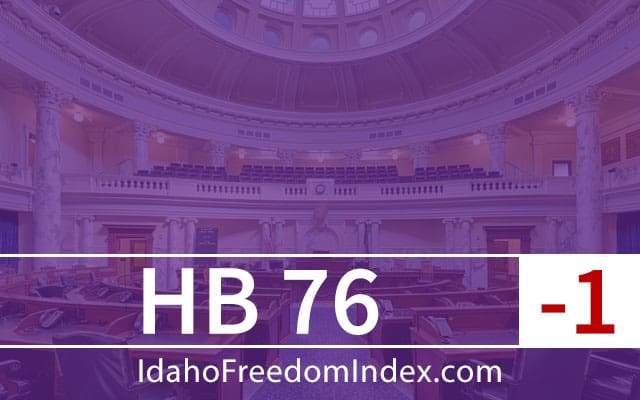


Bill description: HB76 would establish a regulatory framework for ebikes.
Rating: -1
Does it give government any new, additional, or expanded power to prohibit, restrict, or regulate activities in the free market? Conversely, does it eliminate or reduce government intervention in the market?
HB76 adds a three-part definition for an electric-assisted bicycle. This definition establishes three classes of ebikes. Class 1 has a motor that assists riders when they are pedaling, but it stops once the bike reaches 20 mph. Class 2 has a motor with a throttle that propels riders, and stops once the bike reaches 20 mph. Class 3 has a motor that assists riders when they are pedaling, and it stops once the bike reaches 28 mph. For all three classes, the battery cannot generate more than 750 watts.
These three classes provide very narrow requirements for defining an ebike under Idaho law, restricting the innovation and design of manufacturers in the free market.
(-1)
This bill impedes innovation and design for manufacturers of mopeds as well, by amending the definition of a moped to apply only to limited-speed cycles that have wheels that are 20 inches or less in diameter.
(-1)
Lastly, this bill adds a section that requires manufacturers to conform to very specific label requirements for ebikes. The label requirements include listing the classification number, top assisted speed, and motor wattage for the ebike, in at least 9 point Arial font. This imposes a very specific regulation on manufacturers.
(-1)
Does it directly or indirectly create or increase any taxes, fees, or other assessments? Conversely, does it eliminate or reduce any taxes, fees, or other assessments?
HB 76 establishes that an ebike is not a moped, motorbike, motorcycle, motor-driven cycle, or a motor vehicle. With such a distinction, it adds a section to state law, excluding ebikes from any requirement for driver’s licenses, titles, registration, or license plates. This excludes operators of ebikes from paying the fees associated with these requirements, including the $15-$55 fee for a driver’s license or $25 motorcycle registration fee.
(+1)
Does it in any way restrict public access to information related to government activity or otherwise compromise government transparency or accountability? Conversely, does it increase public access to information related to government activity or increase government transparency or accountability?
HB 76 would allow operators to use ebikes in the same areas where traditional bikes are used, unless they are specifically prohibited by a local ordinance. Under this change, local governments would be required to discuss such a decision in a public meeting, allowing an opportunity for public input.
(+1)


